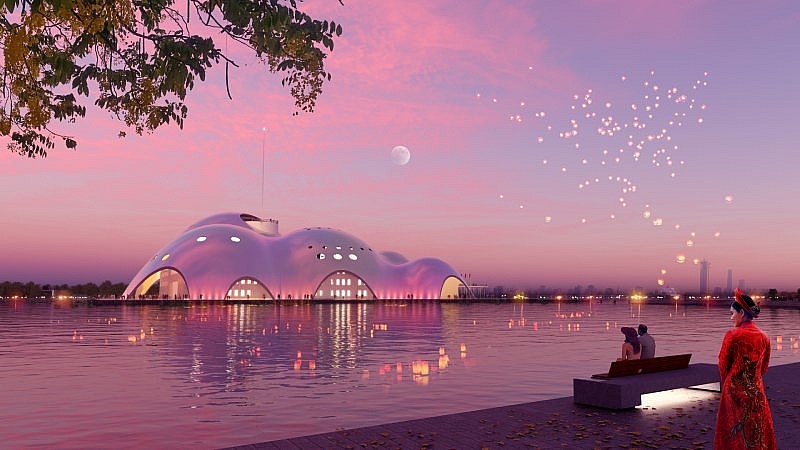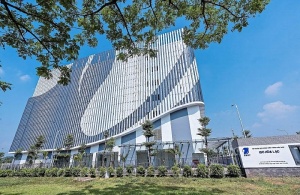Hanoi’s new opera house to become a cultural landmark
Hanoi People’s Committee approved detailed planning for the central axis of Quang An peninsula on November 28. Covering over 44 hectares across Quang An and Tu Lien wards in Tay Ho district, the project will include a municipal opera house, a cultural theme park, religious and spiritual facilities, entertainment zones, and commercial hotel services.
At the heart of this ambitious plan is the Hanoi Opera House, set to float on Dam Tri Lake near West Lake. Described as a monumental cultural project by Tay Ho authorities, the opera house aims to draw visitors from around the globe, positioning itself as a symbol of Hanoi’s sophistication and creative spirit.
With a projected investment of approximately VND10 trillion ($408 million), the opera house will be developed through a socialisation model under the stringent supervision of Hanoi People’s Committee, ensuring excellence from design to construction and operation.
The project’s design is being spearheaded by world-renowned Italian architect Renzo Piano, a recipient of the prestigious Pritzker Prize – often referred to as the Nobel Prize of architecture.
For the Hanoi Opera House, he has envisioned an ultra-thin roof shell structure, measuring just 200–600mm thick. This revolutionary concept, conceived by Piano four decades ago, can now be realised thanks to modern construction techniques.
 |
| 3D architectural perspective of the Hanoi Opera House |
Inspired by the gentle ripples of West Lake, the opera house’s floating dome will be adorned with a pearl-effect ceramic finish. This material will reflect light and capture the dynamic interplay of the sky and water, creating an ever-changing visual spectacle throughout the day. At dawn, dusk, or under the city lights, the dome will take on different hues, mirroring the natural beauty of its surroundings.
Beyond its architectural brilliance, the Hanoi Opera House will incorporate advanced technologies to ensure an exceptional experience for artists and audiences alike. The main auditorium will feature a system of mechanised acoustic panels that adjust to reflect, absorb, or control reverberation based on the demands of each performance. This adaptability will ensure optimal sound quality for diverse artistic programmes, from symphonies to contemporary productions.
Key functional spaces, including a grand lobby, an opera hall, a multifunctional theatre, and support facilities, have been meticulously planned to meet international standards. Renzo Piano has described the opera house as more than just a venue; it will serve as a cultural hub and a community destination for both residents and visitors.
“This musical island is not only a place for performances but also a cultural rendezvous, offering opportunities for leisure and inspiration,” Piano shared his vision for the project. He expressed his hope that the Hanoi Opera House would become a global icon, joining the ranks of legendary venues in Paris, Milan, Berlin, London, and New York.
With its grandeur and purpose, the Hanoi Opera House is expected to host world-class performances, attracting internationally renowned artists and audiences. It aspires to position Vietnam as a leading opera destination, elevating the nation’s profile on the global cultural map.
More than a performance venue, the opera house will embody Hanoi’s ambition to blend tradition with modernity. By showcasing world-class architectural and technological excellence, it will provide Vietnamese audiences with opportunities to engage with the finest cultural offerings from around the globe.
The newly approved plan also establishes a spatial connection from Tay Ho urban area through West Lake and the Quang An Peninsula, extending to the Red River and Co Loa Citadel. This cultural axis will integrate Hanoi’s historic and natural landmarks, preserving the unique charm of West Lake and Dam Tri Lake while harmonising with surrounding architectural and cultural projects.
The project emphasises ecological preservation, with measures to protect the aquatic environment of West Lake and enhance urban infrastructure. Plans include underground spaces, parking facilities, and improved technical systems to support the city’s sustainable development goals.
 | A celebration of culinary and cultural heritage The 2024 Vietnam Regional Specialities Fair promises an immersive journey into the nation's rich culinary and cultural heritage, connecting producers, distributors, and consumers in the heart of Hanoi. |
 | Hanoi set to launch city's main data centre The inauguration ceremony for Hanoi's main data centre will take place on December 6 at VNPT IDC Hoa Lac, part of VNPT Group, located in Hoa Lac High-Tech Park. |
 | Hanoi’s pho now in the big time As part of the Hanoi Food Culture Festival 2024, held from November 29 to December 1, the Hanoi Department of Culture and Sports announced the inclusion of “Pho Hanoi” on the National Intangible Cultural Heritage List. Plans are now underway to protect, promote, and introduce this iconic dish to international visitors. |
What the stars mean:
★ Poor ★ ★ Promising ★★★ Good ★★★★ Very good ★★★★★ Exceptional
Related Contents
Latest News
More News
- Visa data highlights five key payment and travel trends in Vietnam for 2026 (January 14, 2026 | 10:42)
- New Year tourism receipts top $40m in key cities (January 06, 2026 | 08:36)
- Vietnamese passport climbs on global ranking (December 16, 2025 | 08:00)
- Manila becomes a new check-in destination for Vietnamese youth (December 11, 2025 | 18:07)
- Vietjet launches mega year-end ticket promotion (December 10, 2025 | 11:33)
- Dalat leads Vietnam’s 2025 search trends (December 09, 2025 | 13:44)
- Vietnam welcomes record wave of international visitors (December 09, 2025 | 13:43)
- Vietjet launches daily Manila flights to celebrate year-end festive peak season (December 05, 2025 | 13:47)
- The destinations powering Vietnam’s festive season travel demand (December 04, 2025 | 18:33)
- Vietnam named among the world’s most exciting winter destinations (December 04, 2025 | 15:10)

 Tag:
Tag:



















 Mobile Version
Mobile Version